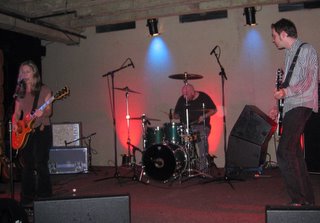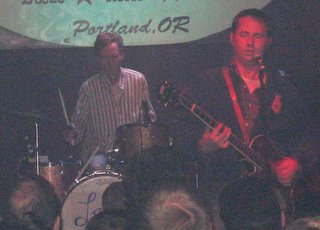Sunday, November 13, 2005
Fields of Plenty
In today's Sunday Oregonian, a review of Fields of Plenty: A Farmer's Journey in Search of Real Food and the People Who Grow It," Michael Ableman writes and photographs his summer way across the U.S., talking to the real people who grow "pure food."
Ableman will be all over the Portland area in the next couple weeks, from farmers markets to fundraisers in support of Sauvie Island Center organics. The Sauvie Island story draws inspiration from his own of Fairfield Gardens.
Ableman will be all over the Portland area in the next couple weeks, from farmers markets to fundraisers in support of Sauvie Island Center organics. The Sauvie Island story draws inspiration from his own of Fairfield Gardens.
Friday, November 11, 2005
Heartless Bastards v. Reigning Sound
 The big fish in my admittedly shallow pool of band-of-the-year contenders looks a lot like Cincinnati's Heartless Bastards, a three piece whose 2005 debut Stairs and Elevators (Fat Possum) is that unlikely recording that starts strong, with a handful of catchy tracks, but evolves over repeated listenings to the point at which I can only point to a couple of the 12 songs as clunkers. Not bad for the notorious "debut" album, which ought to come with a kitchen-sink labelling more often than not. [NOTE: This is not a notorious debut album. I'm referring to those others, where there are some good songs mixed with bad ideas. Stairs and Elevators does not fit that bill.]
The big fish in my admittedly shallow pool of band-of-the-year contenders looks a lot like Cincinnati's Heartless Bastards, a three piece whose 2005 debut Stairs and Elevators (Fat Possum) is that unlikely recording that starts strong, with a handful of catchy tracks, but evolves over repeated listenings to the point at which I can only point to a couple of the 12 songs as clunkers. Not bad for the notorious "debut" album, which ought to come with a kitchen-sink labelling more often than not. [NOTE: This is not a notorious debut album. I'm referring to those others, where there are some good songs mixed with bad ideas. Stairs and Elevators does not fit that bill.]The Heartless Bastards (whose name comes from a Tom Petty cover band's) played their second Portland, Ore., show this year on Monday, November 7, at Doug Fir Lounge in a rare Monday night of great music. You see, across town, the Reigning Sound were setting the table for chanteustic cover band the Detroit Cobras at Sabala's.
A couple of dynamics at work. The crowds at the two could not have been much different for drawing on a similar listener demo. The Doug Fir: non-smoking, prompt openers at 9 p.m., headliners on by 10, off by 11:15. Background music for ad execs and [insert upwardly mobile 30-something slur here]? Maybe. But a music crowd, even if the staging looks a little like an extras cast from the "O.C." Or, the crowd that hasn't gone down to Berbati's yet.
Contrast Sabala's. Smoking. Also packed, but the faces, oh the faces...heroin still has ahold of some of this town's wobbly denizens. And, the ravages of alcohol and other substances. Some folks I hadn't seen much in the past few years, but one look and I knew where they'd been. And dirty. Punk? I guess. It didn't make the music any better or worse.
 What the live act of Heartless Bastards impressed upon me is that
What the live act of Heartless Bastards impressed upon me is that1) There is a new album of material ready to go that marks a progression from Stairs and Elevators, less anthemic perhaps, more involved, maybe better.
2) Singer, songwriter, guitarist Erika Wennerstrom (whose guitar wasn't loud enough in an otherwise big mix) has a ton of gift...a voice that can crawl up and around the high notes, but that has more volume and body than most out there.
3) Wennerstrom is maybe enough to carry a band, but she doesn't have to. Bassist Mike Lamping and drummer Kevin Vaughn provide a huge backbeat that give the songs such a pumping vigor...Vaughn's understated kit relies plenty on floor toms. It's a great sound.
4) Like another band with a vocalist/guitarist and a big bass (drum) sound, the White Stripes, the Heartless Bastards have inspired early enthusiasm from a fan base that learned the songs early and chants right along. This without any real push or reason for these songs to be known. Buzz buzzes, and my ears are still ringing.
Opening for the Heartless Bastards: Deadboy & the Elephantmen. Without further explication, it's a stupid name. A two piece, whose set I missed except for the final song, which I liked. I didn't get the sense that they were in love with the slot...when some drunk bellowed for another song, the drummer looked ready to acquiesce, but couldn't flag down the sound guy to get the house music turned off. The singer guitarist took his cue and walked off too cool to deal. They have a few MP3s on their site and are also on Fat Possum.
 The upshot of the headliner closing at 11:15pm is that you can get across town and catch half the Reigning Sound (which managed to catch some of at least deadboy before its own gig) and then half the Detroit Cobras (Bloodshot artist page) before having to go home, shower, and go to bed. Reigning Sound is the ever-evolving vehicle for Greg Cartwright nee Oblivian, who was never my favorite O but who may have the most gas in the performance tank. His "Bad Man" which the DCs also covered, has ever inch the classic all over it. The sound was tinny and far away, despite the neck-high stage, a governor approach that lets the headliners top out. I love Time Bomb High School, and like its aspects reflected in the follow-up Too Much Guitar. Special secret songs inside included "Static Party" which was not, as you might think, followed by "And Then I Fucked Her." So much for hit singles on parade.
The upshot of the headliner closing at 11:15pm is that you can get across town and catch half the Reigning Sound (which managed to catch some of at least deadboy before its own gig) and then half the Detroit Cobras (Bloodshot artist page) before having to go home, shower, and go to bed. Reigning Sound is the ever-evolving vehicle for Greg Cartwright nee Oblivian, who was never my favorite O but who may have the most gas in the performance tank. His "Bad Man" which the DCs also covered, has ever inch the classic all over it. The sound was tinny and far away, despite the neck-high stage, a governor approach that lets the headliners top out. I love Time Bomb High School, and like its aspects reflected in the follow-up Too Much Guitar. Special secret songs inside included "Static Party" which was not, as you might think, followed by "And Then I Fucked Her." So much for hit singles on parade. It was good to finally see the Detroit Cobras, whose show awhile back with the Dirtbombs I was shut out of...any night but a Monday it'd be tough to walk in. They were fine, with notable covers including Buck Owens' "Hot Dog." Hot dog indeed, photos of performers notwithstanding.
It was good to finally see the Detroit Cobras, whose show awhile back with the Dirtbombs I was shut out of...any night but a Monday it'd be tough to walk in. They were fine, with notable covers including Buck Owens' "Hot Dog." Hot dog indeed, photos of performers notwithstanding.Sunday, November 06, 2005
Robinson Devor's Police Beat
Robinson Devor's second feature film, Police Beat, debuted last night in Portland as part of the NW Film Center's 32nd Northwest Film and Video Festival. There were dozens of us.
Devor's first film was one of my favorites, an adaptation of Charles Willeford's novel The Woman Chaser, starring Patrick Warburton. A stunning adaptation that did alright for the $1million or so it took to make it. It did not do so well to fling doors open on subsequent projects however, and the upshot is that Devor fled LA to Seattle three years ago (a native of New York), where he hooked up with Stranger columnist Charles Mudede.
 The film itself is the story of a Seattle bike cop named Z, Senagales by birth, whose feeling a little blue in the Emerald City after his girlfriend took off on a camping trip with some other guy. His imagination narration of where she is and what she is doing (in his native tongue Wolof, with subtitles) alternates with the "non-narrative" structure of a litany of crime scenes, culled from the Stranger column.
The film itself is the story of a Seattle bike cop named Z, Senagales by birth, whose feeling a little blue in the Emerald City after his girlfriend took off on a camping trip with some other guy. His imagination narration of where she is and what she is doing (in his native tongue Wolof, with subtitles) alternates with the "non-narrative" structure of a litany of crime scenes, culled from the Stranger column.
The crimes, gratuitous at times (a string of "Law & Order" or "Six Feet Under" openings with nary a resolution or conviction in sight), scatter the storyline across Seattle, leading to what Matthew Stadler, who introduced the film, suggested was as much a documentary of our "chaotic Northern neighbor" that shows the future of what cities will be, and something about greenspaces and urban planning, etc. etc.
Stadler referred to himself as a novelist (twice) and a public intellectual in his brief remarks; he's better known to me as the mind and money behind the curious Clear Cut Press, and in a way this is a Clear Cut movie, with tipped hats to Portland and Astoria, and campsites in clear cuts, and so much grey and that tell-tale marker: when someone uses Utopia and Cascadia in the same sentence.
Clear Cut is better known for their funny little paperback books, Charles d'Ambrosio, and maybe the big trees painted by Michael Brophy that are more pander than Pender.
More on the movie: the official site: http://www.policebeatmovie.com/bios.htm.
Devor spoke afterwards to those who stuck around, talking about the difference between LA and Seattle, copious thanks to the sprawl of funding mechanisms that made this happen for $200,000 and to Stadler for use of his Astoria home (the connection is unclear, albeit not all that important), and the use of non-professional versus SAG actors (about $800,000?).
Police Beat isn't a perfect film, and it doesn't have a Warburton to carry it; the nonprofessionals can give you that awful indie feeling, where no one appears to have any affect. Some of the crime scenes made me cringe (as they did the family with the preteens who hustled out of the theater after Z's visit to a porn store complete with a visual anatomy lesson, or the sex scene on the trapeze). Devor says the sound needs work, and he's hammering out distribution.
It is in many ways a regional film, with the blessings and curses that such a label implies. The acting is inspired, the film completed. But how much more can be done that way makes you wonder. Can such a living be made outside the traditional circles? (A look at Oregon's film economy, which exhibited via the shorts at the festival this year, offers a tentative yes...if you are willing to make industrial films for local companies....)
I digress. Police Beat was worth a Saturday night seat at the movie house, and most Saturday nights, that is more than enough. More from Devor forthcoming.
Devor's first film was one of my favorites, an adaptation of Charles Willeford's novel The Woman Chaser, starring Patrick Warburton. A stunning adaptation that did alright for the $1million or so it took to make it. It did not do so well to fling doors open on subsequent projects however, and the upshot is that Devor fled LA to Seattle three years ago (a native of New York), where he hooked up with Stranger columnist Charles Mudede.
 The film itself is the story of a Seattle bike cop named Z, Senagales by birth, whose feeling a little blue in the Emerald City after his girlfriend took off on a camping trip with some other guy. His imagination narration of where she is and what she is doing (in his native tongue Wolof, with subtitles) alternates with the "non-narrative" structure of a litany of crime scenes, culled from the Stranger column.
The film itself is the story of a Seattle bike cop named Z, Senagales by birth, whose feeling a little blue in the Emerald City after his girlfriend took off on a camping trip with some other guy. His imagination narration of where she is and what she is doing (in his native tongue Wolof, with subtitles) alternates with the "non-narrative" structure of a litany of crime scenes, culled from the Stranger column.The crimes, gratuitous at times (a string of "Law & Order" or "Six Feet Under" openings with nary a resolution or conviction in sight), scatter the storyline across Seattle, leading to what Matthew Stadler, who introduced the film, suggested was as much a documentary of our "chaotic Northern neighbor" that shows the future of what cities will be, and something about greenspaces and urban planning, etc. etc.
Stadler referred to himself as a novelist (twice) and a public intellectual in his brief remarks; he's better known to me as the mind and money behind the curious Clear Cut Press, and in a way this is a Clear Cut movie, with tipped hats to Portland and Astoria, and campsites in clear cuts, and so much grey and that tell-tale marker: when someone uses Utopia and Cascadia in the same sentence.
Clear Cut is better known for their funny little paperback books, Charles d'Ambrosio, and maybe the big trees painted by Michael Brophy that are more pander than Pender.
More on the movie: the official site: http://www.policebeatmovie.com/bios.htm.
Devor spoke afterwards to those who stuck around, talking about the difference between LA and Seattle, copious thanks to the sprawl of funding mechanisms that made this happen for $200,000 and to Stadler for use of his Astoria home (the connection is unclear, albeit not all that important), and the use of non-professional versus SAG actors (about $800,000?).
Police Beat isn't a perfect film, and it doesn't have a Warburton to carry it; the nonprofessionals can give you that awful indie feeling, where no one appears to have any affect. Some of the crime scenes made me cringe (as they did the family with the preteens who hustled out of the theater after Z's visit to a porn store complete with a visual anatomy lesson, or the sex scene on the trapeze). Devor says the sound needs work, and he's hammering out distribution.
It is in many ways a regional film, with the blessings and curses that such a label implies. The acting is inspired, the film completed. But how much more can be done that way makes you wonder. Can such a living be made outside the traditional circles? (A look at Oregon's film economy, which exhibited via the shorts at the festival this year, offers a tentative yes...if you are willing to make industrial films for local companies....)
I digress. Police Beat was worth a Saturday night seat at the movie house, and most Saturday nights, that is more than enough. More from Devor forthcoming.
Friday, November 04, 2005
Ladies and Gentlemen, Mr. Soul...Sam Cooke!
This Sunday, my review of the excellent biography of Sam Cooke by Peter Guralnick, Dream Boogie, ran in The Oregonian. Some days 700 words feels long (some days 400 feels long...the new protocol for most O! reviews), but I could have gone on and on. Maybe I did.
 You can link to the review here, although the Oregonlive site has been somewhat stingy of late at retrieving the articles at the links it left for them; it was there when I linked this morning.
You can link to the review here, although the Oregonlive site has been somewhat stingy of late at retrieving the articles at the links it left for them; it was there when I linked this morning.
The Salon review, which was a somewhat cool reception, wondered, as I did, what is next for Mr. Guralnick, suggesting perhaps Otis Redding or Charlie Rich. A great question. I saw him read a few years back, after Last Train to Memphis was published. Quite the conversationalist, although I can't remember what he said or where we were (Colorado maybe?). Generally regarded as a Good Guy.
Anyway, one thing interesting about the book is how contained it is to Cooke's life. No mention of the Hall of Fame entry, no follow ups on who some of the key players became (Bobby Womack, a huge player, suffers somewhat from this early career anonymity in Dream Boogie).
On the other hand, that other version of the story, "Soul Man Brought Down," has been told, in what is virtually the only other biography out there, and out of print at that, Daniel Wolfe's You Send Me.
A final note, at this moment. I can not highly enough recommend Sam Cooke's Live at the Harlem Square Club, recorded in January 1963, and released with great Guralnick liner notes 20 years later. It is the performer that Otis Redding channels in his later performances, engaging and raw and electrified. And, with the schizophrenia of the Cooke catalog, which still seems to suffer from the split in publishing rights, which consequently means finding something with "Cupid" and "Keep Movin' On" both on it a real challenge, it might be the best first start.
UPDATE (November 20, 2005): John Leland reviews Dream Boogie for the New York Times, complete with a brief audio medley of Sam sounds.
 You can link to the review here, although the Oregonlive site has been somewhat stingy of late at retrieving the articles at the links it left for them; it was there when I linked this morning.
You can link to the review here, although the Oregonlive site has been somewhat stingy of late at retrieving the articles at the links it left for them; it was there when I linked this morning.The Salon review, which was a somewhat cool reception, wondered, as I did, what is next for Mr. Guralnick, suggesting perhaps Otis Redding or Charlie Rich. A great question. I saw him read a few years back, after Last Train to Memphis was published. Quite the conversationalist, although I can't remember what he said or where we were (Colorado maybe?). Generally regarded as a Good Guy.
Anyway, one thing interesting about the book is how contained it is to Cooke's life. No mention of the Hall of Fame entry, no follow ups on who some of the key players became (Bobby Womack, a huge player, suffers somewhat from this early career anonymity in Dream Boogie).
On the other hand, that other version of the story, "Soul Man Brought Down," has been told, in what is virtually the only other biography out there, and out of print at that, Daniel Wolfe's You Send Me.
A final note, at this moment. I can not highly enough recommend Sam Cooke's Live at the Harlem Square Club, recorded in January 1963, and released with great Guralnick liner notes 20 years later. It is the performer that Otis Redding channels in his later performances, engaging and raw and electrified. And, with the schizophrenia of the Cooke catalog, which still seems to suffer from the split in publishing rights, which consequently means finding something with "Cupid" and "Keep Movin' On" both on it a real challenge, it might be the best first start.
UPDATE (November 20, 2005): John Leland reviews Dream Boogie for the New York Times, complete with a brief audio medley of Sam sounds.
